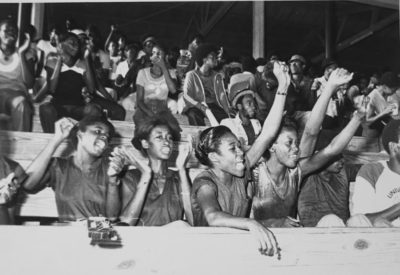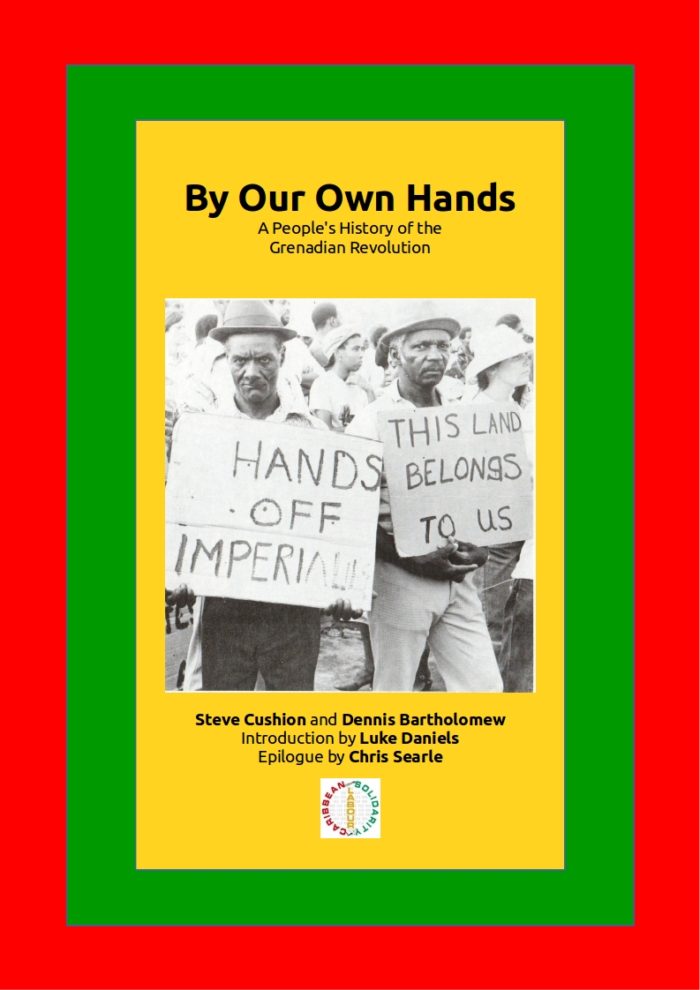
Grenada – Forward Ever
Grenada – Forward Ever (G-FE) was formed in 2018. It recognises the tremendous social, economic and educational progress made by the Grenadian people during the Revolution of 1979. The United States invaded Grenada in 1983 to quash these gains and erase its memory from history. We will oppose this plan and fight against all forms of colonialism and support the struggle for self-determination by oppressed people.
We will assist organisations and individuals in Grenada and elsewhere, seeking to advance the material, economic, social and general well-being of the people of Grenada in support of the advances made during the Revolution.
We will do this by: –
- Publishing and disseminating information and materials, with a focus on the history and inheritance of the Grenada Revolution.
- Undertaking research,
- Holding events, and
- Lobbying, canvassing and commissioning any other activity.
The Grenada Revolution – An overview
A new document, THE GRENADA REVOLUTION – Four years of freedom – Achievements, Challenges and Collapse, has been published and is now available for downloading.
This document provides a summary of the momentous events that occurred in Grenada between the Revolution (Revo’) of 13 March 1979 and the US invasion of October 1983. It covers, in outline, the history of Grenada, the preparation and planning of the Revolution, the successes of the Revolution, its collapse, the US invasion and the lessons that can be learned from its collapse.
THE GRENADA REVOLUTION – Four years of freedom … can be opened from 2021 11 02 – THE GRENADA REVOLUTION Four years of freedom Achievements, Challenges and Collapse.
By Our Own Hands – A People’s History of the Grenadian Revolution
A pamphlet from CLS by Steve Cushion and Kwabena Dennot Nyack
Published by Caribbean Labour Solidarity, By Our Own Hands… illustrates the tremendous strides made by the people of Grenada during the brief period of the revolution.
 Between 1979 and 1983, the people of the Caribbean nation of Grenada made a courageous attempt to overcome the legacy of slavery, British colonialism and a viciously corrupt post-colonial dictatorship.
Between 1979 and 1983, the people of the Caribbean nation of Grenada made a courageous attempt to overcome the legacy of slavery, British colonialism and a viciously corrupt post-colonial dictatorship.
The tragic last few days of the Revolution have obscured the remarkable achievements of the Grenadian people during the previous four years. In the face of the unceasing hostility of the United States government and its continual destabilisation campaign, the people of Grenada rebuilt their economy with an emphasis on social justice and economic stability rather than mere profit for, mainly foreign, capitalists; they established a remarkable education system and improved their health service; they started a house-building and housing repair programme that addressed the needs of the poorest members of society.
By Our Own Hands… can be downloaded from the bottom of this page http://cls-uk.org.uk/?p=279.
The Importance of the Grenada Revolution

Before its sighting in 1498 by that well-known charity benefactor, Christopher Columbus, Grenada was inhabited by the Caribs, who had invaded and killed the previous inhabitant, the Arawaks. The name given to Grenada by the Arawaks was believed to be Ciboney. The Caribs resisted European domination for more than one hundred years after being sighted by Columbus.
From the earliest European settlement in Grenada, enslaved Africans were kidnapped to Grenada. Contrary to popular Western culture the Africans resisted their capture. In Grenada, this manifested in numerous revolts, including the Fédon rebellion of March 1795.
Fédon was influenced by the ideas emerging from the French Revolution, especially the Convention’s abolition of slavery in 1794. Fédon stated that he intended to make Grenada a “Black Republic just like Haiti”. Fédon and his revolutionaries controlled most of Grenada between 1795 and June 1796. Over 14,000 of Grenada’s 28,000 enslaved Africans joined the revolutionary forces in order to write their own emancipation and transform themselves into “citizens”. However, more than 7,000 of these freedom fighters perished in the fight for independence.
Although enslavement was “abolished” in 1834 the plight of Grenada’s African population remained relatively unchanged until the 1951 “revolution” of Eric Gairy. Gairy had limited success in weakening the control that Britain had over the island, leading to independence in February 1974. Independence under Gairy was, for the people of Grenada, a mirage as Gairy did not have the ability or vision to take the people beyond the fight for independence.
Notwithstanding his incompetence, Gairy tried to retain power despite his loss of popularity. He used extreme violence to keep control but was overthrown by a popular revolution on 13 March 1979 by the New Jewel Movement (NJM), led by Maurice Bishop.
The Peoples Revolutionary Government formed after the Revolution (Revo’) embarked on a wide-ranging series of social, economic and educational plans, which brought great and tangible benefits to the people of Grenada.
In 1983 tensions within the NJM led to the collapse of the Revo’, culminating in the killing of Maurice Bishop and others close to him on 19 October of that year. The United States, which had, under Reagan, attempted on numerous occasions to undermine the Revo’, used this opportunity to invade Grenada. After a week of heavy fighting the US forces, with a fig-leaf Caribbean contingent, captured Grenada and set about dismantling the gains of the Revo’.
Their first act was to put on a show trial of the remaining leader of the NJM, the Grenada 17, who they captured following the invasion. Mounting a sustained campaign, led by their 56th US Psychological Warfare Unit, the invaders claimed that these leaders had stolen money from the Treasury; planned to slaughter all Grenadians; sold Grenada to Cuba; built underground cities for Soviet Union troops, who were to be stationed in the country; and who killed Maurice Bishop.
The Psychological Warfare Unit co-opted local and regional figures to manage the “trial”, which despite was notorious for its many blatant irregularities and received many justified complaints, convicted the leaders of murder and sentenced them to death. This was condemned worldwide by numerous organisations including Amnesty International and was declared a “…travesty of justice…” by many others. After an intense campaign, the death sentences were counted and replaced by life imprisonment.
The Grenada 17 were released following a global campaign.
To subscribe to Grenada-Forward Ever’s email list. Go to https://mailchi.mp/65d89750ca33/so0jveueff or https://bit.ly/3hJNmBL.
To supply the names and dates of women, men and events significant to Grenada’s place in the world please email the Secretary of Grenada – Forward Ever at the email address below.
We welcome any corrections, additions and amendments to our articles, posts and calendar entries. To do so please contact the Secretary of Grenada – Forward Ever at mob’ +44 7401 625 276 or email: info@grenada-forwardever.net.
Support our work
The work of Grenada – Forward Ever is funded entirely by donations. We have been effective in what we do, as a result of these donations. Please use the button below to support our work.
